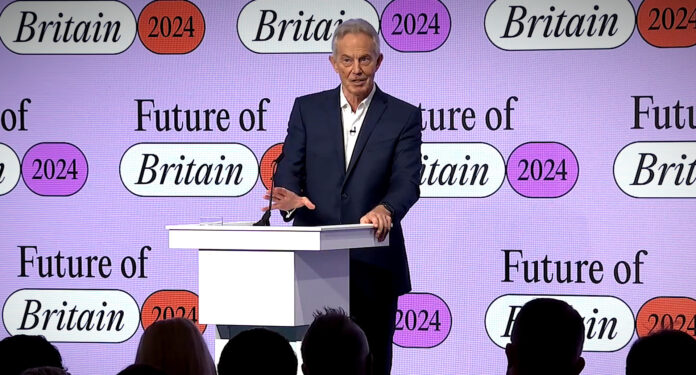The only way out of this mess is with technology, an old Labour prime minister told a new Labour prime minister in London today (June 9) – four days after a new UK government won power in a landslide election victory, and got a proper look at its economic ‘inheritance’ for the first time. Its task to fix a broken nation is too massive – said Sir Tony Blair to Sir Keir Starmer – just with “stable government” and “conventional policies”, even if these should be “pursued with vigour”, as planned. “There is only one game-changer,” he said. “Twenty-first century technological revolution”.
This was the message from Tony Blair, the former UK prime minister, speaking at the Future of Britain conference, organised by The Tony Blair Institute (TBI) for Global Change, a UK-based non-profit think-tank with a grander global agenda – described variously as a kind of “globe-straddling foundation” more often set up by ex-presidents, and as a “McKinsey for world leaders”. Technology, and AI in particular, is the answer, said Blair, to the “perennial progressive dilemma whereby the sensible people appear not to be radical, and the radical people appear not to be sensible”.
He added: “[It is] the answer to the unproductive, binary choice between state and market.” Blair, the last leader of the Labour Party to over-turn a decade of Tory rule (19 years in 1997; 15 years in 2024), and the last of any party to win by such a margin (179 seats in 1997; 174 in 2024), also issued an open letter to Keir Starmer, the new prime minister, in The Times that advises the same: that a “triple whammy of high taxes, heavy debt, and poor outcomes”, plus an ageing and sickening population, will not be reversed just by straighter, smarter policy-making.
Starmer’s new cabinet must take its only chance to be more radical, he said – by harnessing digital-change tech to drive economic growth. The circumstances are grim, he said, but the opportunities are significant – and unique and unknowable. “At first glance, the state of the public finances might make this moment seem like the most limiting in living memory to be forming a new government. Yet if you consider the opportunities now presented by technology, it might actually be the most exciting and expansive.”
He added: “I don’t think there has ever been a better time to govern. A better time to effect change. A better basis for optimism and a surer reason for hope. But only if we understand how the world is changing and how we use that change to change our country… This is an era of transformation. Things which were impossible will become possible; advances which would have taken decades will happen in a few years or months; the improvements in efficiency we can make, the radical benefits in outcomes we can secure, could be truly revolutionary.”
At the event in London – which also featured Wes Streeting, the new UK health secretary, and Demis Hassabis, chief exec at DeepMind, the darling of the UK AI scene, plus other luminaries – Blair said AI-enabled reform could, under a “plausible albeit rapid AI-uptake scenario”, generate sufficient UK tax revenues to “offset all the extra fiscal pressure facing the UK up to 2040”. TBI calculates public-sector AI could drive £12 billion of “extra fiscal space” a year by the end of this parliamentary term, up to £40 billion per year within a decade, and £100 billion per year by 2040.
These figures, it appears, comprise £10 billion in savings by the end of this parliamentary term (about four years) and £35 billion by the end of the next cycle (about eight) by implementing AI to save a fifth of public-sector “workforce time”; plus exchequer savings of £0.6 billion and £1.2 billion in the same time frames with “even a narrow version of a preventative healthcare programme focused just on cardiovascular disease”; plus £4 billion and £10 billion in net savings through the introduction of a digital ID scheme to cut bureaucracy and improve access to public services.
Investing in “AI-enabled education” can raise educational attainment and boost GDP by six percent in the long term, calculates TBI. It has published a package of measures covering these various public-sector AI initiatives. In the private sector, the “rapid adoption of AI” could further “boost tax revenue and double these gains”, it said. In a policy document published today, entitled The Economic Case for Reimagining the State (available here), TBI writes: “Such is the scale of the economic challenges facing the UK that it needs another engine of growth to overcome them.”
It continues: “The new government needs to tap into the only structural tailwind that is pushing in a positive direction: technological progress. Here there are grounds for optimism. We are at the dawn of a new AI era that is already producing large financial and productivity gains among businesses at the frontier of adoption. If these gains scale up to the wider economy, they could boost UK growth by up to 1.5 percentage points per year for a decade, according to the International Monetary Fund.
“It is highly uncertain when these gains will [show] in the UK’s growth statistics, but prominent economic forecasters have started to pencil in gains… from 2027 onwards. Higher AI-enabled growth would make the new government’s job significantly easier, raising tax revenues and creating the space… to choose how to spend them. The UK is well-placed… as it probably ranks third – after the US and China – in the global AI race. [But] the economic gains from AI will not occur automatically. The government will need to… support the diffusion of AI-era tech across the economy by adopting a pro-innovation, pro-technology stance.”

